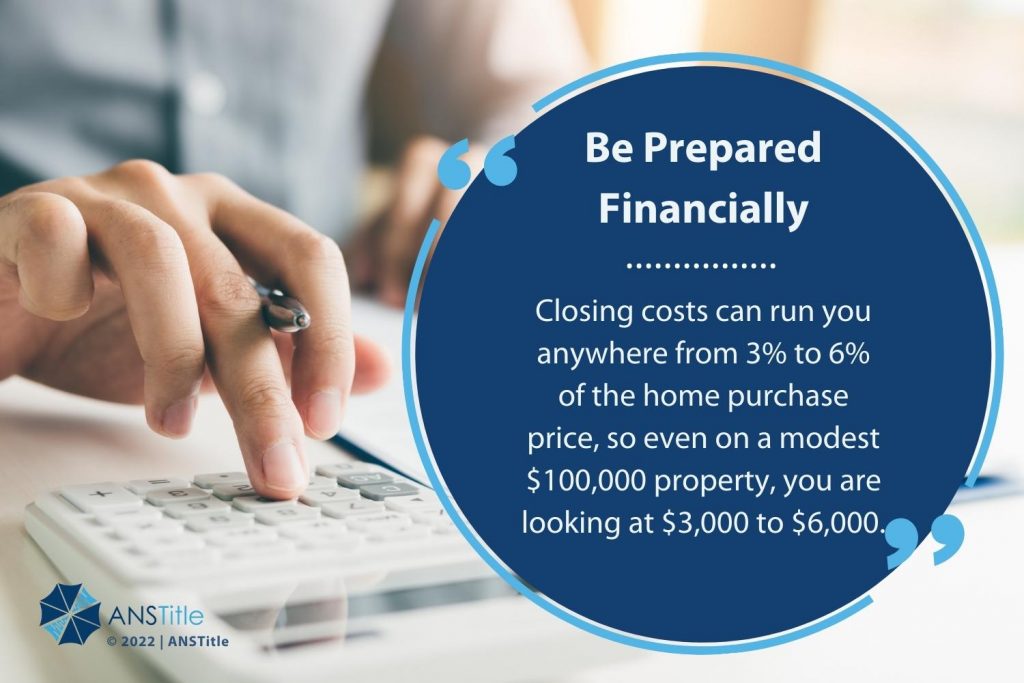Home buying can be a stressful and complex process even when everything is going smoothly. After all, it is the biggest purchase most people will make in their lifetimes. However, you can feel a lot more confident when you sit down at your closing with preparation.
While you will most likely have several professionals guiding you through the process, it is a good idea to research home buying on your own before you start looking for a new house. It is especially important to understand what happens at the closing and what you can do to ensure it goes without a hitch. The 10 tips below will give you a quick overview of what to keep an eye on while preparing for the purchase of your new home.
Get Pre-Approved for a Loan
Getting pre-qualified for a mortgage indicates to sellers that you are a serious, financially-stable buyer. Your pre-approved status can help you win the contract when there are multiple offers on a house. Sellers don’t want to waste time working with someone, only to find out weeks later that they did not get approved for a loan.
 A pre-approval will also help you determine how much house you can afford. When you know your budget in advance, you won’t waste time putting up offers on homes that you won’t qualify for. Furthermore, you don’t want to lose your deposit if you sign a contract and then, are unable to secure the financing needed to close. Â

Gather Documents in Advance
Mortgage lenders will require all kinds of documents when underwriting your loan. In order to ensure you are creditworthy, they will ask for pay stubs, tax returns, bank statements, and other personal paperwork. Whether you keep your records in a shoebox or electronically, try to dig up these documents as soon as you start looking at properties. The faster you provide the paperwork to your bank, the faster your loan will be processed and approved. You may want to request a mortgage loan checklist from your bank when you ask them for pre-approval.
Another document critical to closing on your home is your government-issued photo ID. Make sure that it has your correct legal name and it is not expired.
Be Prepared Financially
When purchasing a home you need to have sufficient savings to put a down payment and cover the closing costs. Depending on your lender, type of loan, and property, you may be required to put down anywhere from 3% to 20% or even more. Additionally, if your down payment is less than 20% of the home price, you will have to carry private mortgage insurance (PMI) until you reach the 20% threshold. PMI will add to your monthly mortgage payment. If you can wait, beef up your savings before you start looking at properties.
Closing costs can run you anywhere from 3% to 6% of the home purchase price, so even on a modest $100,000 property, you are looking at $3,000 to $6,000. While it is possible to finance your closing costs, it is not the best financial move. If you roll them into your mortgage, you will end up paying interest on those expenses over the term of the loan.
If you are paying directly for your closing costs, you will have to provide that money along with your down payment at the time of closing. Due to fraud concerns, the only acceptable payment options include a cashier’s check and a bank wire transfer. Be especially vigilant with wire transfers. Always confirm the wire instructions over the phone with a person already involved in your purchase transaction. Â

Schedule a Home Appraisal and Inspection
As soon as you sign a purchase agreement with the seller, you should schedule a home appraisal and a home inspection. Not only are these reports required by mortgage lenders, but they will also give you peace of mind that you are not buying a lemon. The home appraisal will ensure that the purchase price is in line with its actual value, and the inspection will reveal any issues that may need to be fixed prior to the sale.
While not required, you may want to also pay for a survey of the property, which will help you determine if there are any boundary concerns, such as incorrectly placed fencing, etc.
Purchase Home Insurance
Your lender will also require that you obtain home insurance for the property prior to closing on your home. While shopping around may help you find a reasonably priced policy, you are still looking at a few hundred to a few thousand dollars, depending on the size, age, and condition of the home. Remember to allocate money in your budget for the entire annual home insurance premium. Also, check with your lender whether the policy you selected meets their requirements before paying for it.
Mind Your Credit
As you may already know, your mortgage approval is contingent not only on your income but also on your credit rating. After the home-buying frenzy in the early 2000s that led to the housing market crash of 2008, lenders have become a lot stricter in their approval process. It is not uncommon for banks to check your credit one last time in the days before your closing. Refrain from making large purchases or being late on any bills as this may affect your credit score negatively and cause your lender to withdraw your loan approval. Â

Review Your Paperwork in Detail
Purchasing a property involves a lot of paperwork, which will most likely be unfamiliar and confusing for the first-time homebuyer. While you are looking at homes, take the time to research what documents are used in a typical closing and look at a few samples.
When you are nearing your closing, it is especially important to review your closing disclosure (also known as CD or HUD-1 settlement statement) as this document outlines the specifics of your mortgage and closing costs. Make sure that the loan terms match the terms offered in your loan estimate. The law entitles you to receive a copy of this document at least 24 hours before your closing.
When reviewing the paperwork also make sure that your name matches your government-issued ID, the property address is correct, and there are no other errors. Do not hesitate to reach out to your real estate broker, mortgage lender, or title agent if you discover any discrepancies or have questions about a specific item. ANSTitle is one of the largest privately-held New York title insurance agencies with national service.
Arrange a Final Walk-Through Before Closing on Your Home
Even though you may have toured the property multiple times earlier in the process, you should arrange a final walk-through in the last few days before the closing. You would want to inspect any repairs the seller has agreed to perform, as well as ensure they have moved out and left the home in good clean condition. Also, verify that any appliances or other items that were included in the sale are still in the house. Â

Confirm the Closing Time and Place
Remember to confirm the time and place of your closing. After weeks of negotiating with the seller, gathering paperwork for your lender, and preparing to move, the last thing you want to do is miss your closing due to miscommunication. Closings are typically held at the title insurance company’s office, but can also occur at the offices of your real estate broker, attorney, or mortgage lender.
If you are co-purchasing the home with your spouse or another individual, make sure to bring them along. Every buyer listed on the paperwork will have to be present to sign the documents. Don’t forget to also bring your government-issued photo ID, your cashier’s check or wire transfer receipt, and any other outstanding paperwork to avoid further delays.
Don’t Let Your Emotions Run You
Purchasing a home can be a highly emotional process, especially for first-time homebuyers. Emotions, however, can sometimes cause us to make bad or rash decisions. It is better to approach the home purchasing process as a business transaction.
Until you sign the final paperwork at your closing, be mentally prepared to walk away from the transaction if an issue comes up with the property or your mortgage application. If everything is going smoothly, you should, however, quit looking at other properties. It will distract you from the important tasks you need to handle before your closing and it may even make you second-guess and stress over your original choice.
If you need any further guidance on how to prepare for closing on your home, please feel free to reach out to our experienced ANSTitle agents. With over 50 years of combined experience in title insurance and transactional real estate in New York and New Jersey, we can offer advice in any scenario.
